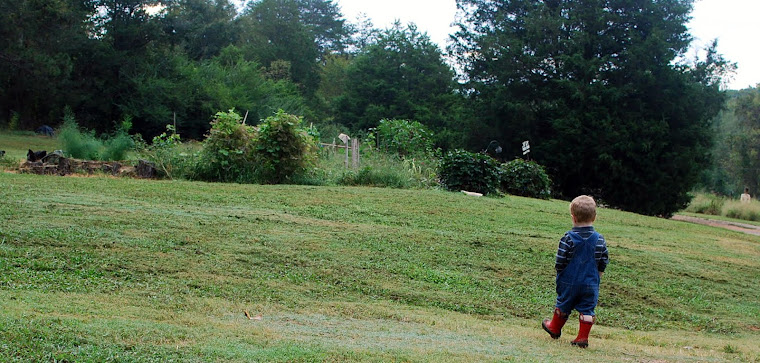Its a great paradox that the renewal of culture comes from those that retreat from it: monks. There is often the understanding that those who have moved to the land have sort of "given up" on the world and left it to its miseries. Yet, most of us on the land feel very different, feel as if we must move to the land not only for our own souls, but for the sake of the world (see the BXVI quote on my sidebar). Yet, I was working on a project and came across this quote from ol' Bene in Spe Salvi and it was a great articulation and example of this thought:
"While this community-oriented vision of the “blessed life” is certainly
directed beyond the present world, as such it also has to do with the building
up of this world—in very different ways, according to the historical context and
the possibilities offered or excluded thereby. At the time of Augustine, the
incursions of new peoples were threatening the cohesion of the world, where
hitherto there had been a certain guarantee of law and of living in a
juridically ordered society; at that time, then, it was a matter of
strengthening the basic foundations of this peaceful societal existence, in
order to survive in a changed world. Let us now consider a more or less randomly
chosen episode from the Middle Ages, that serves in many respects to illustrate
what we have been saying. It was commonly thought that monasteries were places
of flight from the world (contemptus mundi) and of withdrawal from
responsibility for the world, in search of private salvation. Bernard of
Clairvaux, who inspired a multitude of young people to enter the monasteries of
his reformed Order, had quite a different perspective on this. In his view,
monks perform a task for the whole Church and hence also for the world. He uses
many images to illustrate the responsibility that monks have towards the entire
body of the Church, and indeed towards humanity; he applies to them the words of
pseudo-Rufinus: “The human race lives thanks to a few; were it not for them, the
world would perish ...”[12]. Contemplatives—contemplantes—must
become agricultural labourers—laborantes—he says. The nobility of
work, which Christianity inherited from Judaism, had already been expressed in
the monastic rules of Augustine and Benedict. Bernard takes up this idea again.
The young noblemen who flocked to his monasteries had to engage in manual
labour. In fact Bernard explicitly states that not even the monastery can
restore Paradise, but he maintains that, as a place of practical and spiritual
“tilling the soil”, it must prepare the new Paradise. A wild plot of forest land
is rendered fertile—and in the process, the trees of pride are felled, whatever
weeds may be growing inside souls are pulled up, and the ground is thereby
prepared so that bread for body and soul can flourish[13]. Are we not perhaps seeing
once again, in the light of current history, that no positive world order can
prosper where souls are overgrown?"

Ah, the Benedict option! This is well written. I need to show Ben.
ReplyDeleteIn our own patch of wilderness, our life of prayer is sustained by our attendance weekly, if not more often, of Divine Liturgy and other Offices at the nearby Holy Transfiguration Skete, which is as Benedictine as it is Byzantine. Those monks imbue this place with the presence of God.
ReplyDelete